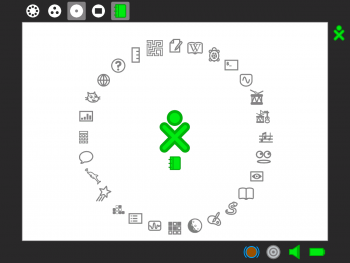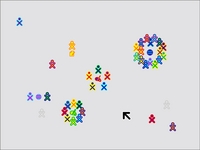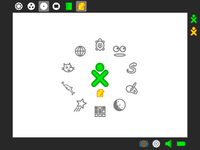Sugar: Difference between revisions
Jump to navigation
Jump to search
No edit summary |
(Consistent punctuation for bullet points) |
||
| (33 intermediate revisions by 18 users not shown) | |||
| Line 1: | Line 1: | ||
__NOTOC__ |
|||
{{OLPC}} |
|||
'''Development of Sugar takes place at [http://wiki.sugarlabs.org Sugar Labs].''' |
|||
<div style="float:right"> |
|||
__TOC__ |
|||
</div> |
|||
Sugar is the core of the [http://wiki.sugarlabs.org/go/Human_Interface_Guidelines OLPC Human Interface]. Its goal is to turn the Laptop into a fun, easy to use, social experience that promotes sharing and learning. |
|||
[[Image:Sugar.png|350px|thumb|none|The Sugar Home view]] |
|||
Small Houses |
|||
[[Image:Neighborhood.jpg|200px]][[Image:Home.jpg|200px]][[Image:Web1200.png|200px]] |
|||
2009 |
|||
==Getting Sugar== |
|||
Sugar is available for [http://wiki.sugarlabs.org/go/Downloads/Landing_page many platforms]: |
|||
; on the [[XO]] laptop |
|||
OCR iPro level2 |
|||
: If you have an XO, it's running Sugar. Read [[Updating the XO]] to update to the latest version. |
|||
Providing Customer Service |
|||
; as [[OS images]] |
|||
: You can install or upgrade an XO to a new OS image. You can also run a Sugar image using [[:Category:Emulation|emulation]] on almost any operating system, including Windows. |
|||
; as a bootable CD and USB stick |
|||
: You can download a [http://wiki.sugarlabs.org/go/Sugar_on_a_Stick Sugar on a Stick] image file and burn it to a CD, and then boot and run it on almost any x86 PC, including x86 Macintosh. |
|||
; as packages for common Linux distributions |
|||
: You can install Sugar as an alternative desktop on several [http://wiki.sugarlabs.org/go/Community/Distributions Linux Distributions]. |
|||
; as runnable source code for developers on Linux |
|||
: Developers on Linux can install from the latest source code using [http://wiki.sugarlabs.org/go/Jhbuild Jhbuild]. |
|||
==Getting started== |
|||
You can explore the Sugar interface at the [http://en.flossmanuals.net/sugar/ Sugar manual], or in our [http://laptop.org/8.2.0/manual/ Getting Started guide]. |
|||
Note the "Frame key" [[Image:Key_frame.jpg|40px]] at the top-right corner of your [http://laptop.org/en/laptop/start/keyboard.shtml keyboard], |
|||
which toggles the presence of the Frame on and off the screen. (The Frame |
|||
is the black border around the screen that holds the activity taskbar, |
|||
clipboard, buddy list, etc.) |
|||
You can restart Sugar by pressing the Ctrl-Alt-Erase* keys simultaneously. |
|||
*(the XO laptop doesn't have a typewriter-esque "Backspace" key, but rather a "Erase" key... which is great for erasing things!) |
|||
==Develop== |
|||
Developers, once you've installed Sugar, you can go on to develop for the environment. |
|||
===Exploring Sugar=== |
|||
* [http://www.redhatmagazine.com/2007/02/23/building-the-xo-introducing-sugar/ Building the XO: Introducing Sugar - Red Hat Magazine 2007-02-23] |
|||
* [[Sugar_with_sugar-jhbuild|Build]] from sources |
|||
* Read the human interface [http://wiki.sugarlabs.org/go/Human_Interface_Guidelines guidelines] |
|||
* Get an overview of the [[Sugar Architecture|architecture]] |
|||
* [[Sugar_Activity_Tutorial|Write]] your own activity |
|||
* Check out the library of [[Sugar Code Snippets]] |
|||
* [[Understanding Sugar code]] organization |
|||
* See a list of Sugar [[Activities|activities]] and specifications |
|||
* [http://git.sugarlabs.org/ Sugar source repository] |
|||
* [http://bugs.sugarlabs.org The Sugar bug tracker] |
|||
* [http://wiki.sugarlabs.org/go/Development_Team Development Team page] |
|||
=== Learning More === |
|||
*[http://www.flossmanuals.net/make-your-own-sugar-activities/ Make your own Sugar activities], ''A published tutorial on developing Sugar activities'' |
|||
*[[Creating an Activity]], ''General information about how to create an activity'' |
|||
*[[Activity tutorial]], ''Technical information about how to create an activity'' |
|||
*[[Activity bundles]], ''Technical information abot how to package an activity'' |
|||
*[[Sugar Activity Builder]], ''General Script to make a Sugar's activity skeleton'' |
|||
*[[Hacking Sugar]], ''Tips and tricks'' |
|||
===Contribute=== |
|||
* Go to our [http://wiki.sugarlabs.org/go/Sugar_Labs/Getting_Involved Getting Involved] page. |
|||
* Subscribe to the [http://lists.sugarlabs.org/listinfo/sugar-devel mailing list] (here are [http://lists.sugarlabs.org/pipermail/sugar-devel/ its archives]) |
|||
* Join the [irc://irc.freenode.net/sugar IRC channel] |
|||
* Give Sugar some [http://bugs.sugarlabs.org/query?status=new&status=assigned&status=reopened&order=priority love]! |
|||
* Test and report [http://bugs.sugarlabs.org/newticket issues] |
|||
[[Category:Sugar]] |
|||
[[Category:Developers]] |
|||
[[Category:Subsystems]] |
|||
Name: Richard Johnson |
|||
School: Winterhill School |
|||
Introduction |
|||
My name is Richard Johnson. I am currently employed by Minute Solutions as an advisor Minute Solutions is a large company that advises other toy stores by giving advice on maintaining their technology and content management |
|||
As an advisor at the company, I have been asked to review the situation at Small Houses, Small Houses is an company that that supplies items such as furniture ,flooring, wallpaper and lighting. |
|||
They have recently created a website to where customers from around the world can browse the stock at Small Houses although the site doesn’t yet support any forms that allow customers to pay via the internet. |
|||
Contents |
|||
Unit Requirements |
|||
Task 1 |
|||
-Identify senior staff at Small Houses |
|||
Identify the types of end users in fancy fishes |
|||
The end users that are employed by Small Houses are as follows |
|||
-The owner |
|||
-Administration staff |
|||
-Warehouse staff |
|||
Training needs for the End-Users |
|||
Each group of end users at Small Houses have different training needs and end-user requirements, almost most of all the staff at fancy fishes will need an ECDL course, this course will help them learn the basic word processing, spreadsheet training and an e-mailing course. |
|||
If all employers in the company enrolled in ECDL and improve their computering skills it will make orders correct and complete, a lot more quickly and will keep payment details up to date |
|||
Methods for the end-users to record their training needs |
|||
The appropriate methods that end-users could use to record their training needs are as follows |
|||
• Survey |
|||
• Questionnaire |
|||
• Interviews |
|||
Appropriate sources of technical information |
|||
The appropriate sources of technical information includes |
|||
• Google |
|||
• Help |
|||
• Forums |
|||
• Manufacturers website |
|||
Task 2 |
|||
Process of identifying existing hardware/software |
|||
Identifying existing software |
|||
To view existing software in a pc, |
|||
Click " Start " on the taskbar and then click on the " Control Panel " icon as shown below. |
|||
Please doubleclick the " Add or Remove Programs " icon: |
|||
Identifying existing hardware and software |
|||
Start the Add/Remove Hardware Wizard using Add/Remove Hardware item in the Control Panel. |
|||
1. Click Next until to start installing the device. |
|||
2. Select Add/Troubleshoot a device and click Next. |
|||
Summary of existing hardware and software |
|||
Methods of identifying Usage of existing hardware and software |
|||
summary of the Usage of existing hardware and software |
|||
potential improvements in existing hardware and software |
|||
identify existing automated procedures |
|||
Routine/complex automated procedures |
|||
Routine automated procedures |
|||
-Virus scans |
|||
-disk scans |
|||
-disk defragmentation |
|||
-backing up |
|||
Routine automated procedures would benefit fancy fishes in many ways, for example a routine virus scam, programmed to scan daily as a background process can keep the systems working at optimum performance. Disk Defragmentation can compress all of the saved data into one area of the disk making loading and booting time faster. |
|||
Complex automated procedures are |
|||
-Log-in checks |
|||
-batch file checks |
|||
-complex queries |
|||
-mail merge procedures |
|||
-macros to complete tasks |
|||
If Koi consultancy wanted to secure their network they could use password protection and a captcha |
|||
A password is a secret word or string of characters that is used for authentication to prove identification to prove identity or gain access to a resource |
|||
A Captcha is a type of challenge-response test used in computing to ensure that the response is not generated by a computer. The process usually involves one computer (a server) asking a user to complete a simple test which the computer is able to generate and grade. |
|||
Automated routine virus scanners can keep the |
|||
system free of viruses |
|||
such scanners are as follows: |
|||
Nod32 |
|||
Eset smart security |
|||
MacAfee |
|||
Norton360 |
|||
Panda security |
|||
AVG |
|||
Bullguard |
|||
Summary of existing hardware and software |
|||
Team working |
|||
Team members |
|||
Richard Johnson |
|||
Luke Werra |
|||
Daniel Hartley |
|||
Roles/ Responsibilities |
|||
Richard Johnson |
|||
hardware / software manager |
|||
Luke Werra |
|||
Admin |
|||
Daniel Hartley |
|||
co-ordinator |
|||
Minutes |
|||
Details of meetings |
|||
10/03/09 people present- Danny, Richard, Luke |
|||
2:30pm |
|||
Topics covered- in today’s discussion we sorted out the teams roles responsibilities |
|||
Issues- I wanted to be a software manager, as did Luke, after a discussion Luke decided to take on the responsibility of Admin, and I agreed to take the role of software, and hardware manager |
|||
12/03/09 people present- Richard, Luke |
|||
11:30am |
|||
Topics covered-today, we discussed, and each created a word document to show on how we would find out about what hardware and software is installed on the pc’s at fancy fishes |
|||
17/03/09 people present- Danny, Richard, Luke |
|||
14:30pm |
|||
Topics covered- we have discussed what routine automated / complex automated procedures could be used at fancy fishes, to help improve their systems. |
|||
19/03/09 people present- Richard, Luke |
|||
11:32am |
|||
Topics covered- we have discussed what security can be put in place to make a safer, secure networking environment for fancy fishes. |
|||
Latest revision as of 10:22, 30 October 2012
This page is monitored by the OLPC team.
Development of Sugar takes place at Sugar Labs.
Sugar is the core of the OLPC Human Interface. Its goal is to turn the Laptop into a fun, easy to use, social experience that promotes sharing and learning.
Getting Sugar
Sugar is available for many platforms:
- on the XO laptop
- If you have an XO, it's running Sugar. Read Updating the XO to update to the latest version.
- as OS images
- You can install or upgrade an XO to a new OS image. You can also run a Sugar image using emulation on almost any operating system, including Windows.
- as a bootable CD and USB stick
- You can download a Sugar on a Stick image file and burn it to a CD, and then boot and run it on almost any x86 PC, including x86 Macintosh.
- as packages for common Linux distributions
- You can install Sugar as an alternative desktop on several Linux Distributions.
- as runnable source code for developers on Linux
- Developers on Linux can install from the latest source code using Jhbuild.
Getting started
You can explore the Sugar interface at the Sugar manual, or in our Getting Started guide.
Note the "Frame key" ![]() at the top-right corner of your keyboard,
which toggles the presence of the Frame on and off the screen. (The Frame
is the black border around the screen that holds the activity taskbar,
clipboard, buddy list, etc.)
at the top-right corner of your keyboard,
which toggles the presence of the Frame on and off the screen. (The Frame
is the black border around the screen that holds the activity taskbar,
clipboard, buddy list, etc.)
You can restart Sugar by pressing the Ctrl-Alt-Erase* keys simultaneously.
- (the XO laptop doesn't have a typewriter-esque "Backspace" key, but rather a "Erase" key... which is great for erasing things!)
Develop
Developers, once you've installed Sugar, you can go on to develop for the environment.
Exploring Sugar
- Building the XO: Introducing Sugar - Red Hat Magazine 2007-02-23
- Build from sources
- Read the human interface guidelines
- Get an overview of the architecture
- Write your own activity
- Check out the library of Sugar Code Snippets
- Understanding Sugar code organization
- See a list of Sugar activities and specifications
- Sugar source repository
- The Sugar bug tracker
- Development Team page
Learning More
- Make your own Sugar activities, A published tutorial on developing Sugar activities
- Creating an Activity, General information about how to create an activity
- Activity tutorial, Technical information about how to create an activity
- Activity bundles, Technical information abot how to package an activity
- Sugar Activity Builder, General Script to make a Sugar's activity skeleton
- Hacking Sugar, Tips and tricks
Contribute
- Go to our Getting Involved page.
- Subscribe to the mailing list (here are its archives)
- Join the IRC channel
- Give Sugar some love!
- Test and report issues



